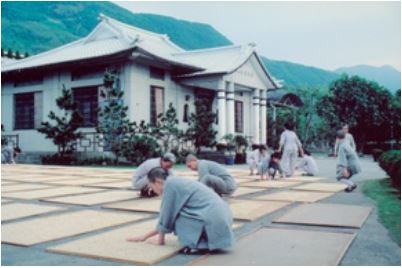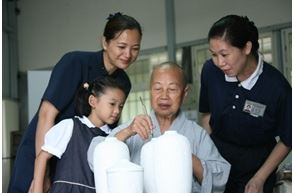 |
|
In her early years as a nun, Master Cheng Yen made three vows. The first is not accepting offerings / donations, the second is not holding prayers, the third is not accepting disciples. At that time he wanted pure Dharma practice. Then he saw a poor indigenous woman suffering from childbirth complications due to not being able to pay the hospital down payment.
The woman 's pool of blood and continued visits by three Catholic nuns inspired Master Cheng Yen to vow to establish the Tzu Chi Buddhist Humanitarian Foundation to help the poor.
|
Because of Tzu Chi, she broke her oath and accepted disciples. However, she wants her students to be involved in society and helping people in need rather than pursuing their own happiness. To help the poor, Jing Si House provides assistance to the poor, sick, and the lonely elderly. At the same time, Master Cheng Yen taught the Bhaisajyaguru (Medicine Buddha) Sutra with the hope that all poor and sick people could be freed from suffering and attain happiness.
|
Since before the founding of Tzu Chi until now, Griya Jing Si nuns support all their needs independently. All the nuns living in Jing Si House had to farm and make crafts to support their living. This is the principle of “One Day Without Work, One Day Without Eating”, a teaching passed down from Master Bai Chang, the Zen master of the Tang Dynasty.
|
|
 |
|
Agricultural and handicraft work, which has been continuously carried out at Jing Si House for the past forty years, includes growing rice, knitting baby shoes and making cotton gloves, sewing clothes, making wood carvings, sewing gloves; growing chrysanthemums, making pottery, and a steady source of income today – making powdered drinks from nuts and making candles; the total covers more than twenty-one types of work. The living expenses of the residents of Jing Si House are clearly separated from the donations received from Tzu Chi donors around the world. All donations made to the Buddhist Tzu Chi Foundation are fully used to help the poor and suffering people.
|
 |
|
Jing Si Griya nuns not only make a living for themselves but also provide space, office supplies, and accommodation for the staff of the Buddhist Tzu Chi Foundation. They themselves are also implementers and spiritual leaders of Tzu Chi's Four Main Missions: Charity, Health, Education, and Humanist Culture. The Jing Si Griya nuns will continue to keep their vows of compassion and devote themselves to helping all sentient beings.
Currently, the Jing Si House is the spiritual home for all Tzu Chi people. Tzu Chi volunteers around the world return to this inner hometown every year to deepen their self-training and purify their hearts.
|
|
|
|
| Source: www.tzuchi.org |











 Sitemap
Sitemap